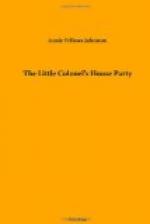Joyce had finished setting the supper-table, and while she waited for the potatoes to boil she stood with her face pressed against the kitchen window, looking gloomily out into the back yard.
It was not a cheerful outlook. Nothing was to be seen but the high board alley fence with a broken chicken-coop leaning against it, the weather-beaten old stable, and a scraggy, dripping peach-tree. The yard was full of puddles, and still the rain splashed on. The sight made Joyce want to cry.
“If I wasn’t at home,” she said to herself, “I should think that I am homesick, for I feel the way I did that day up in Monsieur Greville’s pear-tree in the old French garden. Then I was tired of France and everything foreign, and would have given all I owned to be back in America. Now I am here with mother and the children, but still I am as unhappy and dissatisfied as I was then. I wonder why!”
It had been less than a year since Joyce had had that wonderful winter in Touraine with her cousin Kate, but it seemed such a long, long time ago, in looking back upon it. She had settled down into the common humdrum round of duties so completely that sometimes it seemed to her that she had never been away at all; that she must have dreamed that year into her life, or read about it as happening to some other girl.
As she stood with her face pressed against the window-pane, the noise in the dining-room suddenly ceased, and Mary came into the kitchen, followed by the rest of the menagerie. “I’m tired of being a lion,” she said, wiping her flushed little face with the sleeve of her apron, and shaking back her funny little tails of hair tied with red ribbon, that were always bobbing forward over her shoulders.
“I’ve roared till my throat is sore, and I’m hungry. Isn’t supper most ready, sister?”
Joyce glanced at the clock. “It’ll be ready in ten minutes,” she answered, and returned to her survey of the back yard.
“I wish that we were going to have dumplings for supper to-night,” said Holland, “and turkey and sausages. Don’t you, Mary?” He snuffed hungrily at the saucepan on the stove.
“No,” said Mary, pausing thoughtfully, as if considering a weighty matter. “I’d rather have ice cream and chocolate cake. If I had a witch with a wand that’s what I’d wish for supper to-night. Wouldn’t you, sister?”
Joyce turned away from the window and lifted the lid from the kettle in which the stew was bubbling. “I don’t know,” she said, gazing dreamily into the depths of the savoury stew. “If I had that old witch with a wand that you are always talking about, I’d not stop simply with something to eat. I would wish myself back in Tours, with Madame sweeping down to dinner in her red velvet gown, and the candle-light shining on the cut glass and silver. I’d wish for dinner to be served elegantly in courses as Henri did it there every night, and I’d hear old Monsieur making his little jokes over the walnuts and wine. And afterward there wouldn’t be any dishes for me to wash, as there are here, and at bedtime Marie would come with my candle and untie my slippers and brush my hair. Oh, it’s so nice to be waited on! You don’t know how I miss it sometimes. It is horrid to be poor.”




